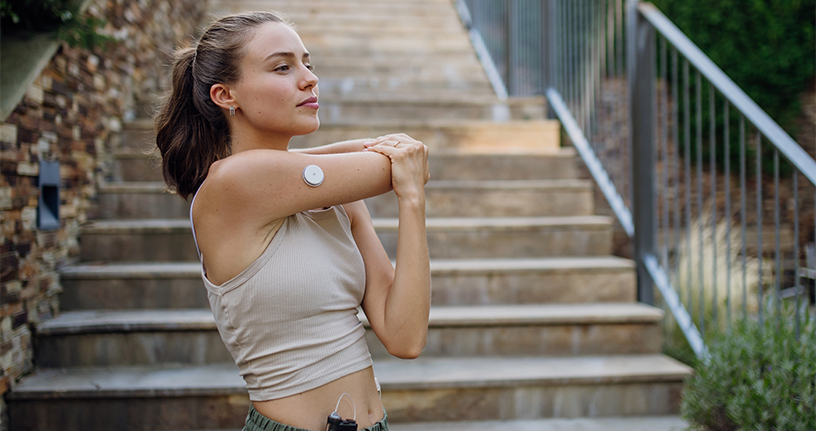The benefits of Diabetes and Exercise can be immense. Exercise manages blood glucose levels and revolutionizes life for diabetic patients!
Regular physical activity provides numerous advantages to those living with diabetes. Exercise plans help manage blood glucose levels more effectively while improving overall health – leading to longer, healthier, and happier lives and greater well-being.
What is diabetes?
Diabetes is a chronic disease that occurs either when the pancreas is not producing enough insulin (Insulin is a hormone that regulates the blood glucose level) to regulate its blood glucose or when the body cannot effectively use the insulin it produces. Hyperglycemia is a term given to the increased blood sugar level in the body. There are two main types of diabetes: type 1 diabetes and type 2 diabetes.
Frequent urinating, feeling thirsty, losing weight without trying, blurry vision, dry skin, feeling of numbness or tingling in hands or feet, nausea, and sores that heal slowly are some of the common diabetes symptoms that should not be neglected.
Blood glucose levels and exercise benefits
Blood glucose, or blood glucose concentration, is essential to energy production. Maintaining stable blood glucose levels is crucial to prevent complications such as neuropathy, retinopathy, and cardiovascular issues from emerging. Effective control has an enormously positive impact on overall health, physical performance, and quality of life.
Regular physical activity is vital to effectively managing diabetes. Exercise increases insulin sensitivity and makes it easier for your body to use glucose effectively – studies indicate this effect could even contribute to weight reduction of 5-10% with its health benefits.
Physical activity has long been proven to help combat anxiety and boost overall mental health benefits, making the experience enjoyable and worthwhile. Integrating multiple fitness activities into an effective wellness routine will add new dimensions of enjoyment.
How to motivate yourself for exercise?
Patients living with diabetes often struggle to stay physically active. Overcoming fatigue and lack of motivation may prove challenging, yet physical activity should never be discounted when considering effective diabetes management.
Start small to meet this challenge; gradually build intensity and duration over time. Engage in activities you enjoy, so exercising doesn’t seem like work! For optimal success, begin with short yet manageable workout sessions you look forward to; expand upon them over time.
Group activities or training sessions add social components that can enhance motivation and consistency, helping create long-term habits and improving overall health. Setting small, incremental goals helps kick-start long-term health improvement.
Which exercises are best for diabetes patients?
-
- Cardiovascular Health: Participating in aerobic activities such as brisk walking and gym classes can greatly benefit cardiovascular health – this is especially important given that those living with diabetes face increased risks related to heart issues.
- Strength Training: Strength training exercises to build muscle mass can increase metabolism, promote healthy body composition, and heighten physical endurance.
- Resistance training: increases muscle strength by making your muscles work against a weight or force. Start slowly under the supervision of an expert. Try push-ups, sit-ups, lunges, shoulder taps, and chest expansion.
- Flexibility exercises: It improve the range of motion around joints, like yoga or Pilates.
- Balance exercises: Heel-toe walking, tightrope walking, single-leg knee lift, and single-legged stance are some common balance exercises that can be considered.
Considering your current health, consult your doctor to find the best exercise for you. Also, discuss with gym trainers or yoga instructors how to practice exercise or yoga accurately.
Some of the common diabetes medicines to treat your diabetes along with exercise and diet, include Oxramet XR 10/1000mg, Istavel 100 mg, Glycomet SR 1000mg, Glycomet 250 mg, Glycomet GP (500+1)mg, Bigomet 500mg, etc. Your doctor will prescribe the best diabetes medicine with the right dosage you need to take to manage diabetes.
Keep taking type 2 diabetes medicine in the dosage and duration it is prescribed to keep diabetes symptoms under control.
Conclusion
Physical activity tailored specifically for diabetes management can do wonders for your overall well-being, from controlling blood sugar to building cardiovascular and muscle strength gains. These benefits should not be underrated! By selecting low-impact activities and relying on technology for fitness journey management, regular physical activity will enable you to manage diabetes while increasing your overall quality of life successfully – start exercising today if you wish to experience what exercise has in store!



